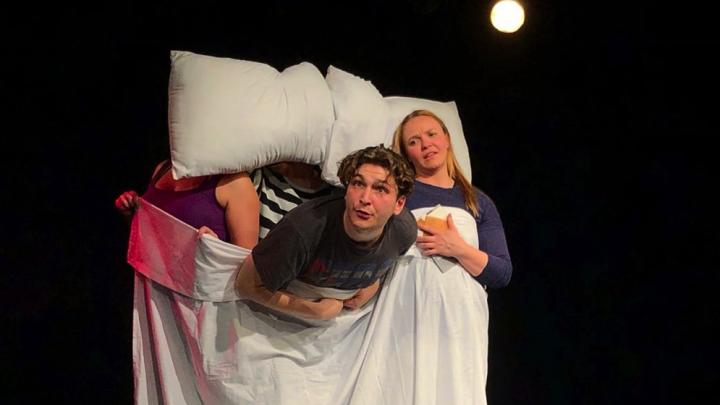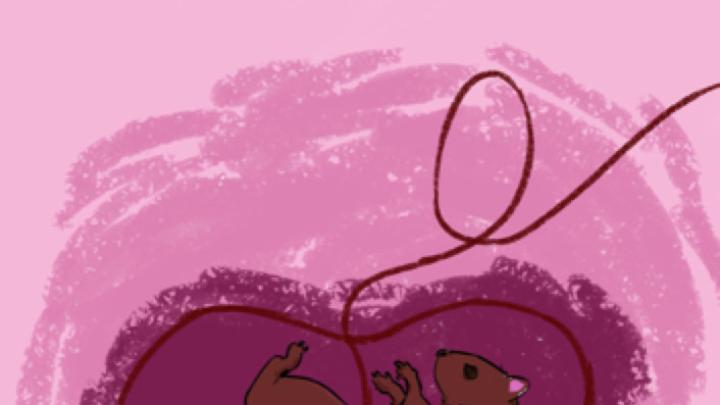There are many things about the “real world” that no one tells you upon graduating college, such as: you can take a ladder on the London Tube, but not on a bus.
I learned this the hard way while attempting to move set pieces for my first non-collegiate theater production. I do not have a learner’s permit, let alone a license, but suddenly I found myself fervently wishing I owned a van.
As it turns out, producing theater is 50 percent emailing, 40 percent schlepping, and 10 percent the actual performance. Or, at least, it is when you’re on a shoestring budget and reliant on the London public transport system.
After graduating from Harvard in 2016, I moved to the U.K. to further my English studies at Oxford. Having spent more of my time in college in dark theaters than in libraries (sorry, Mom, sorry, Dad), I entered my first term resolved to focus on my studies rather than on productions. But old habits die hard, and within a few weeks I had rounded up fellow master’s students for the Oxford University Drama Society’s “Cuppers” competition; we won Best Graduate Contribution, and I was solemnly handed a black felt beret to prove it.
I relapsed further when a mutual friend introduced me to Jessica, a fellow American studying Shakespeare at King’s College London. She proposed that we seek space in London to put on The Squirrel Plays, a trilogy that her screenwriting professor, Mia McCullough, had been working on since 2005. Jessica had fallen in love with the text at a reading in Chicago, and despite my better judgment and looming assignments, I read the play and fell in love with it, too.
McCullough was inspired to begin writing when a friend told her she had discovered a squirrel living in her attic; the notion of an animal arriving unannounced in one’s home, she thought, could be an interesting allegory for pregnancy. In the plays, a “squirrel infestation” in one childless couple’s attic represents an unplanned pregnancy; an extermination, abortion; and a neighborhood association unable to decide how to address the problem morally and financially, Congress.
McCullough uses humor to approach a difficult subject. Abortion is portrayed as a complex, emotional issue about which women should be allowed to feel conflicted. Because I feel passionately about a woman’s right to govern her own body, I knew this was a production I would be proud to present. The protagonist, Sarah, exterminates the squirrel, but when her husband, Tom, suggests they go to the neighborhood association to propose public payment for exterminations, she balks—she feels it’s a private issue that she’d rather take care of herself. Other women in the association accept the exterminations, but don’t want their dues to pay for them. Undeterred, Tom prepares a memo on his proposal—co-authored with Bob, the neighborhood patriarch. Sarah is vexed by the stale irony of two men writing such a proposal without input from the majority-female association.
The plot maps onto the current abortion debate in America, but Sarah’s relationship to the squirrel, and its extermination, is original. She gives it a gender—male—and sneaks upstairs to talk to and feed it. She knows exterminiation is the right to choice, because the squirrel is making her sick, but she feels deep sadness at its loss. McCullough told me she has always been surprised at the sterility with which the American left discusses the abortion debate; she wanted to create a story about a woman who makes a choice that is right for her body, but feels a tangle of emotions about the resulting hole in her life. Viewers get an intimate look at the person most affected by an unplanned pregnancy, yet most often excluded from decisionmaking regarding her body.
It was because our production needed to show Sarah entering an attic space to confront her squirrel that Celina, our production designer, and I tried pleading with a bus driver to allow our ladder on board. He appraised our six-foot prop and shook his head sadly.
Forty-five minutes and countless vehicular fantasies later, we arrived at The Space, a converted church on the Isle of Dogs, soaked in sweat and rain due to having walked there from Canary Wharf. I wish I could say the rest of the preparations went without a hitch, but I’ll leave you with just one more nugget of wisdom: the use of PVC pipes is best left to a plumber.
The performance itself—that elusive 10 percent—was, happily, free of drama. As we had produced only the first of the three Squirrel Plays, a fact we noted in our program, audience members kept asking when they could see the sequels. It was a tempting question, but Jessica and I were out of money, and in a few months my student visa would expire, so the thought of producing the full show was “squirreled away” in the backs of our minds.
But theater magic has a way of getting ahead of itself. In the course of marketing our production, Jessica and I had schemed up a theater company: Part of the Main (POTM), an enterprise we envisioned to combat the depressing dearth of women employed in every aspect of theatrical productions, from the creative team to the cast and crew. As Americans in London, this is something we’d noticed in theaters on both sides of the Atlantic. We gleefully twisted John Donne’s “No man is an island, entire of itself; every man is a piece of the continent, a part of the main” to serve our cause. We wanted to make women a part of the main, too. It seemed to be a logical extension of The Squirrel Plays.
If you had told me five years ago that I would be living in London on a visa with the express purpose of creating feminist theater, I would have told you that was just as likely as a reality-show host becoming president, but here we are. In September 2017 I was granted a Graduate Entrepreneur Visa through Oxford to make POTM a reality, and this May, one week before the Irish abortion referendum, we previewed two of the three Squirrel Plays (Infestation and Compensation; the third, Eradication, remains a work in progress) at a local fringe festival. We partnered with the British Pregnancy Advisory Service—the British Planned Parenthood—to deliver a talkback about the state of reproductive rights in the U.K. In feedback forms, audience members wrote that the show “brought them much closer to the issue” of abortion, helped them understand the “variety of perspectives in the discourse,” and made them consider “the connections between reproductive justice and racial equality.” This week, we’ll preview two performances at Theatre503, a theater for new writing in Battersea, and on August 2, we’ll be taking on our biggest challenge yet: a month-long run at the Edinburgh Festival Fringe, the largest arts festival in the world, with more than 3,500 shows. Instead of fantasizing about vans, I now dream we’ll score a run with enough time and resources to perform all three plays.
Our expenditures still exceed our income, and we transport most of our props using a subway card. I fill my days with tax forms, Twitter publicity, invoices, receipts, crowd funding, contracts, grant forms, flyer designs, press invitations, and venue negotiations. The realities of producing fringe theater in the “real world” are a far cry from my days at the Harvard-Radcliffe Dramatic Club, where a funding application meant telling the Office for the Arts how passionate you were about a particular play and that you really needed $150 to make giant cookies out of pool noodles (please see: 2015’s Hansel and Gretel). Transport merely meant borrowing dollies to cart entire garden furniture sets down Mount Auburn Street (see: 2015’s The Importance of Being Earnest).
But all good things must come to an end, and one day you’ll find yourself standing in the rain in London, or up in Edinburgh, carrying a ladder a foot taller than you are, or telling a stranger why a play about squirrels contributes to public discourse in an age of global gag rules, referendums, and challenges to Supreme Court precedent. And it’s that 10 percent—the theater magic that comes alive when the lights go down and a hush falls over the house, and then again when they go back up and the murmurs of thoughts begin—that makes it all worth it.









